- Home
- Vicki Delany
Gold Web
Gold Web Read online
Gold Web
A Klondike Mystery
Vicki Delany
For Caroline, Julia, and Alex
1
The last thing he saw in this world was my shocked face.
He stared directly into my eyes. Red blood and white foam bubbled around his lips as he struggled to speak. “MacGillivray.”
“I am Mrs. MacGillivray. Help is coming,” I said.
He gasped, his breath sounding rough and wet in his chest.
“Try not to move.” I didn’t know why I was whispering. Somehow it seemed appropriate.
“Culloden.” He breathed the single word with great effort. Then, with a final burst of blood, his head dropped to one side, his eyes rolled back, and he lay still.
The man had appeared out of nowhere, heading straight for me. He reached out his arms as he approached, and then he simply crumpled to my feet. Instinctively, I’d dropped to the ground beside him and gathered him into my arms.
His face was recently shaven, showing an excess of old acne scars, his eyes a light grey. The bags under those eyes were dark and deep. Lines radiated out from his mouth, and his nose appeared to have been broken several times over the years. His unkempt beard and thin, unwashed hair were heavily streaked with grey. Blood saturated his filthy jacket and many-times-mended shirt.
I had never seen him before, yet he knew my name.
I uncurled my arms from his back and laid him as gently onto the ground as I was able. I closed my eyes for a moment and took a single deep breath. I lifted my hand in front of my own face. Wet red streaks glistened in the dim light of the alley. I felt liquid soaking into the folds of my dress.
I’d been on my way home for supper in the company of …
“Angus,” I bellowed, unceremoniously shoving the body aside. “Angus, where are you?” I struggled to my feet, heart pounding, arms flailing, feet slipping in the blood seeping into the dirt of the alley. My son had been with me, full of chatter about the antics of one of his friends. I had not been paying the slightest bit of attention, instead thinking of the evening to come. I was most certainly paying attention now.
“Angus,” I called again.
I was alone. Alone with a dead man. It was unnaturally quiet: in Dawson City, Yukon Territory, in the summer of 1898, there were always people around, even in a back alley at suppertime. I wiped my wet hands on the hips of my dress in a fashion that would have had Miss Wheatley denying me tea. I started down the alley. It was still daylight — this was, after all, the Yukon in July.
A blond head popped around a corner, and I almost screamed. Instead I said, quite sharply, “What on earth? Didn’t you hear me calling?”
“Of course I heard you calling, Mother,” he replied, not at all put out. “That’s why I came back. He’s gotten away.”
“Gotten away?” I sucked in a breath. “I would most certainly hope he’s gotten away.” My twelve-year-old son had charged down a deserted alley in pursuit of person or persons unknown who had recently murdered a man.
Angus brushed past me and dropped to the ground beside the body. I stood above him and we were silent for a few moments. The man lay on his back, empty eyes staring into the sky. His right side was matted with blood and a pool had formed beneath him.
“Footpads,” I said, “in Dawson. I never.”
“Do you recognize him, Mother?”
“No.”
“Did he say anything to you?”
I hesitated. “He seemed to know my name.”
“I’ll wait here. You’d best go for the Mounties.”
“What’s going on there?” a voice called from the dry goods shop. We were in the narrow alley at the rear of the Savoy Saloon and Dance Hall, of which I am the proprietor. One half of the proprietorship, I should say. As is my custom, I was heading home for something to eat and to change into evening wear before returning to the Savoy to supervise the night’s activities.
Someone had to fetch the police. Someone should remain with the body. Stray dogs, starving feral beasts, were known to creep into town on occasion, and although I had been told there are no rats in the Yukon, I don’t quite believe it. There are always rats. I hate the things with a passion.
I couldn’t leave this man, whoever he might be, to the attention of wild dogs and non-existent rats. Yet I didn’t want to leave my son alone in case the attackers returned.
Two fellows turned the corner of the alley. They were walking slowly, and one was telling the other that an unnamed woman was a “poor excuse for a whore but better than …” His mouth snapped shut at the sight of me, and he whipped off his cap. “Mrs. MacGillivray, what a pleasure.” I felt his eyes run down my body. For once I knew it was not in admiration of my female charms.
“Mrs. MacGillivray,” the second man cried, “are you injured? Has that scoundrel attacked you? By heavens, if he weren’t dead I’d kill him myself.”
“I am unharmed. No one attacked me. Angus and I arrived after the deed was done. Someone, however, needs to fetch the police.” I studied the two men. They alternately smiled stupidly at me and moved closer to get a good look at the body on the ground.
“I said, what’s all the commotion out there?” My across-alley neighbour, wife of the owner of the dry-goods shop, peeked out her door. A scowling-faced woman with a nose like a hatchet and a tick in her right eye, she could barely restrain from spitting whenever she encountered me. The premises next to the shop was a mortuary. The body would not have to be moved very far.
No one answered her question.
“Go for the Mounties, Mother,” Angus said, his voice firm.
Angus had changed recently. He’d headed off into the wilderness on a North-West Mounted Police mission, and I suspected he now considered himself to be a man. At the conclusion of the mission he’d wept in my arms, but that was not something either of us mentioned. He had to grow up someday. But did it have to be so soon?
“Very well.” I straightened my hat and set off on a mission of my own. I am not unknown in the streets of Dawson, and no matter where I might be I make it my business not to be unnoticeable. The moment I exited the alley onto King Street people stopped whatever they were doing to stare at me. I began to regret not sending one of the men for the Mounties. I was, unfortunately, clad in a two-piece, white day dress. Most unsuitable, I’d always known, for the dusty streets of this mining town, but the fabric was so delightful I could scarcely resist purchasing it. Besides, I had the services of an excellent laundress, and I make it a point of honour to sometimes do what is not entirely practical.
Now that I was in somewhat better light, and recovering from the initial shock of the man’s appearance and sudden demise, I could see that the bottom of the blouse and the lap and side panel of my skirt were red with blood. I checked my hands and shuddered. Blood was rapidly drying in the crevices of the skin and around my fingernails. I hurried through the streets, not stopping at cries of my name or gasped inquiries as to my health.
It wasn’t far to the NWMP town detachment on Queen Street. I gathered my skirts in my fists, galloped up the stairs (once again feeling the force of Miss Wheatley’s disapproval — a lady never hurries) and threw open the door. The three men inside turned and stared at me, as their mouths dropped open.
“Mrs. MacGillivray,” the youngest of them cried. “Save us! What’s happened?” He crossed the small room in two strides, grabbed me, and attempted to wrestle me into a vacant chair.
“Unhand me.” I swatted at the over-eager arms. “This is not my blood.”
“So I assumed,” Corporal Richard Sterling said, “or you would not be standing straight, nor have such colour in your cheeks. Nevertheless, you do present quite a sight, madam.”
“The alley behind the Savoy. A man has been att
acked. Killed. Angus is with him … with the body. You’d better come.”
Richard grabbed his hat. “McAllen, you’re with me. FitzHenry, watch the office.”
“But …” FitzHenry, the one who had attempted to minster to my wounds, protested.
“Fiona, go home,” Richard said, ignoring the constable’s protests.
“Don’t you want to know what happened?”
He headed out the door. “Of course I want to know what happened. I’ll call on you later to get the story.” He turned to face me, his boot on the top step. “If I may be so bold as to say so, you need to change and have a bath. The way you look will frighten small children.”
And then he was gone, Constable McAllen following.
I looked at FitzHenry. Tall and gangly, with a prominent Adam’s apple and arms and legs he had trouble keeping under control, I wondered if he was old enough to shave. He flushed blood red under my examination and dropped his eyes to an intense study of the floorboards. They had not been in place for more than a couple of months and already shoddy workmanship was evident in the uneven tread, popping nails, and gaps between the planks. It was no worse than any other building in Dawson. The town had grown so fast, hacked out of sheer wilderness, it was a wonder walls weren’t falling down all around us.
“Good evening, Constable,” I said, preparing to make my departure.
“Mrs. MacGillivray, ma’am,” he coughed. The colour rose even higher in his cheeks. I wondered if he were about to burst spontaneously into flames.
“Yes?”
“You might not want … I mean, you might want … I mean …”
“What do you mean?” I snapped, with more irritation than was polite.
“Nothing, ma’am. Sorry, ma’am.”
“Very well. Good day.” I stalked off, head held high.
When I got home, having received more open stares on the street than even I am accustomed to, I knew what Constable FitzHenry had been referring to. I might not want, he no doubt meant to say, to be seen in public with blood splattered all over my face.
2
I screamed at my reflection in the mirror, which was missing the top right corner, and began scrubbing frantically. Fortunately my arrival had been expected, and Mrs. Mann, our landlady, had laid out hot water and towels so I might freshen up.
I’d come in the front door and gone directly to my rooms, not passing through the kitchen where Mrs. Mann was banging pots and pans.
A light knock on the door.
The door opened and Mrs. Mann stood there. “Will Angus …” Her jaw dropped to the floor. “Mrs. MacGillivray, what on earth have you been up to this time?”
“I came across the scene of an accident,” I replied, not wanting to discuss details. “Help me off with this dress. Will you be able to get it clean?”
Her fingers worked at the row of tiny buttons running down the back of the blouse. She wasn’t quite finished when I yanked it off, sending pearl buttons flying everywhere. With a disapproving “tsk,” Mrs. Mann took the blouse while I slipped out of the skirt.
“The blood isn’t dried yet. If I put it to soak immediately, the stains should come out.”
“Good.”
“Supper’s not finished.”
“I’ll do the cooking while you tend to the dress.”
She eyed me most suspiciously. As well she might. I have many and varied talents but skill in the kitchen is not one of them.
“That blood is drying even as we speak,” I said. “Get to it. The supper will have to wait. Now that I think of it, you’ll have to send something for me later. I have to get back to the Savoy immediately. Angus is assisting the police.”
“Not again!”
“Sadly, yes. Once again.”
3
Angus MacGillivray wanted nothing more in this world than to be an officer in the North-West Mounted Police. To serve his Queen, his country, his fellow men. His mother, he knew, intended that he become a gentleman. Whatever that might be. She insisted on proper grammar at all times, had taught him a bit of Greek and Latin, how to address a duke and a prince, seating arrangements at a formal dinner party. Not that they had met any dukes or princes in Dawson, and they’d never had a dinner party. If company dropped in, they could barely squeeze six around the rough-hewed kitchen table at Mrs. Mann’s boarding house. The tiny, overcrowded house didn’t have a dining room.
Angus’s mother had made her way through life by herself, orphaned as a child and later alone after the death of his father, discarded by his heartless paternal relatives. She’d succeeded because she spoke like an English aristocrat, was perfectly groomed at all times, dressed well, and conducted herself with absolute deportment. It didn’t hurt, he knew, that she was considered to be the most beautiful woman in Dawson, if not the whole territory.
But his mother was a woman, and Angus MacGillivray would be a man someday. He didn’t think it mattered much to his future prospects if he could recite Homer in the original Greek, play the violin (which, thank heavens, they’d left behind in the flight from Toronto), execute a proper bow in the presence of royalty, or wield a fish fork.
No, Angus MacGillivray was destined for great things. Two more years until the twentieth century would arrive. Time to throw off the shackles of the old world and embrace the new.
He’d only be fourteen years old in two more years. Sometimes he feared he’d never grow up.
A good-sized crowd had gathered behind the Savoy. Nothing like a bit of excitement in Dawson to draw the multitudes. The sight of Fiona MacGillivray, running through the streets with her virginal white dress soaked in blood from neck to hem and flecks of blood and brains (the story grew in the telling) dotted across her perfect, yet horror-struck, face, was excitement indeed.
Angus stood protectively over the body, not letting anyone venture too close.
“Search the pockets,” someone said, stepping forward as if to do just that. Angus planted himself firmly in the way. Despite secret boxing lessons with Sergeant Lancaster, a former champion, he was scarcely a match for a full-grown man. And he knew it. But he had been given this responsibility, and he was not going to back down.
“The Mounties have been summoned,” he said, trying to deepen his voice, for about the tenth time. “Leave him until then.”
“Mounties,” a man spat. “Help themselves to the man’s poke they will.”
Angus bristled, but before he could protest he heard a welcome booming voice from the back door of the Savoy. Ray Walker, his mother’s business partner, stepped into the alley, slapping the sturdy billy club he kept behind the bar into his hand. Ray was shorter than Angus, with scarcely an ounce of excess flesh on him, but he was a street fighter from the slums and shipyards of Glasgow and a match for almost any man in town.
“I’d suggest we do what young Angus says,” Walker said, in his indecipherable Glaswegian accent, “and wait for the police. Bar’s open, if anyone’s interested.”
More and more men, and a few less-respectable women, were arriving every minute. Dawson boasted more than its share of drifters. Tens of thousands of people had headed north into the wilderness, on foot, on hearing word of the gold strike at Bonanza Creek. Many, if not most, had not the slightest idea what mining entailed or how remote the Klondike was. When they arrived, after months of hardship, to find that nuggets were not lying on the ground like windfall apples and that placer mining was nothing but darned hard work, a great many of them spent their days wandering from one side of town to the other, their nights crowded into the plethora of saloons, gambling dens, and dance halls. Waiting for the police to arrive was better than another stroll to the end of the street.
When he heard the voice he’d been hoping for, Angus felt the weight of responsibility lift from his shoulders.
“You men have nothing to do today? Get on your way. If you want entertainment the dance halls’ll be opening soon. There’s nothing to see here. George O’Reilly, haven’t you done enough chopping wood d
own at the fort? I don’t want to see any more of you.”
The assembled men shifted and shuffled to let the police through, but no one did as they’d been told and left. Not even Ray’s reminder of the bar so tantalizingly close was enough to distract them from a bloody body. Those at the back pushed forward trying to get a better look.
Corporal Sterling and Constable McAllen emerged from the crowd. They stood quiet for a moment, simply looking. Sterling dropped to his haunches. He held his fingers against the side of the man’s neck, although there could be no doubt he was dead. Sterling pushed himself back to his feet, wiping his hand on his trousers. He spotted the undertaker, standing in the shadows behind Angus. “Mr. Dion, convenient to have you here. You can take him away now, if you please. I’ll be in to talk to you further once I’ve checked around here. Send someone to fetch the doctor, will you?”
Dion grunted, and he and his assistant pushed their cart forward. They loaded the body and wheeled it, arms and legs flapping, the few yards to their place of business. The puddle of blood, seeping into the dust of the alley, remained behind. No one moved.
“Angus, do you know anything about this?” Sterling asked in a low voice.
“We were passing, Mother and I, when —”
“Enough. Tell me inside. Did anyone here recognize that fellow?” he called to the crowd.
Men muttered and shook their heads.
“In that case, didn’t I tell you people to be on your way?”
Show over, the men at the back began to peel away. One by one the others followed.
“Do you have a shovel, Walker?” Sterling asked.
“Aye, for when it snows.”
“Fetch it. Constable, dig that mess under. Then head to Fort Herchmer and get Inspector McKnight.”
“What do you want me to do, sir?” Angus asked. He’d have been embarrassed to know he sounded like a puppy eager to perform tricks.
“Did you recognize that man?”

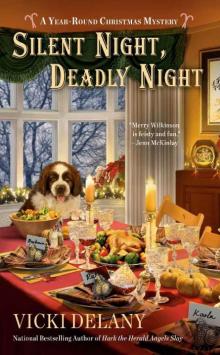 Silent Night, Deadly Night
Silent Night, Deadly Night Coral Reef Views
Coral Reef Views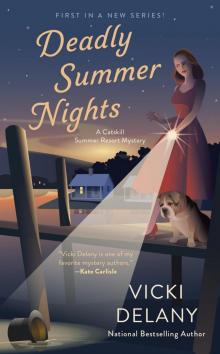 Deadly Summer Nights
Deadly Summer Nights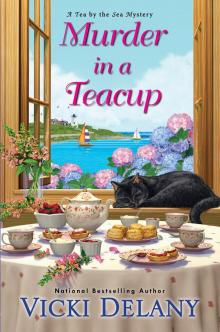 Murder in a Teacup
Murder in a Teacup Whiteout
Whiteout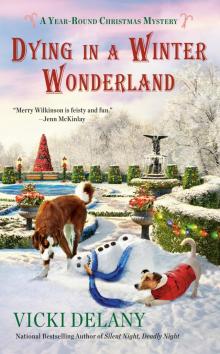 Dying in a Winter Wonderland
Dying in a Winter Wonderland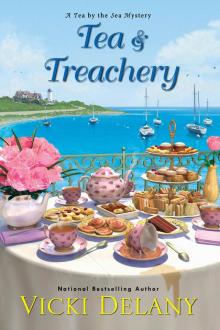 Tea & Treachery
Tea & Treachery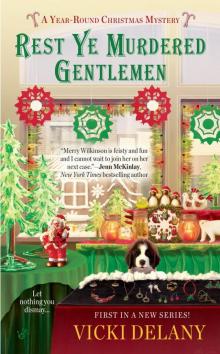 Rest Ye Murdered Gentlemen
Rest Ye Murdered Gentlemen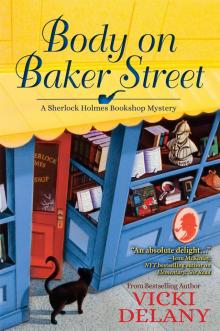 Body on Baker Street: A Sherlock Holmes Bookshop Mystery
Body on Baker Street: A Sherlock Holmes Bookshop Mystery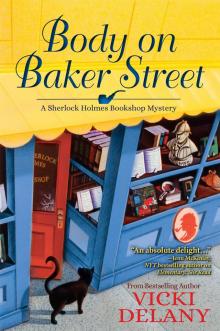 Body on Baker Street
Body on Baker Street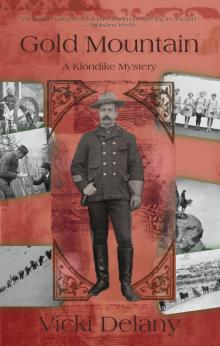 Gold Mountain
Gold Mountain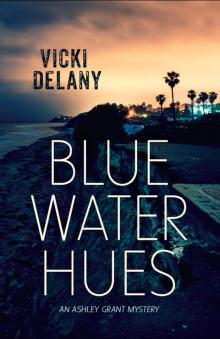 Blue Water Hues
Blue Water Hues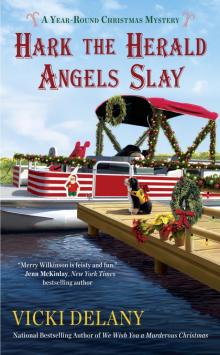 Hark the Herald Angels Slay
Hark the Herald Angels Slay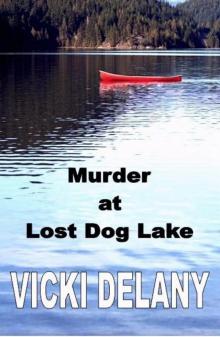 Murder at Lost Dog Lake
Murder at Lost Dog Lake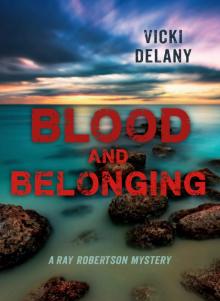 Blood and Belonging
Blood and Belonging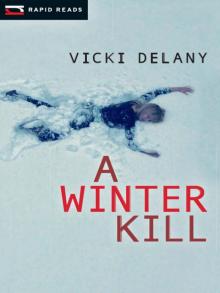 A Winter Kill
A Winter Kill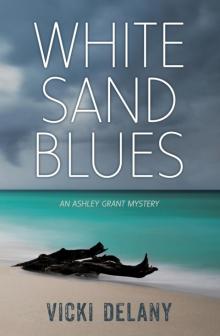 White Sand Blues
White Sand Blues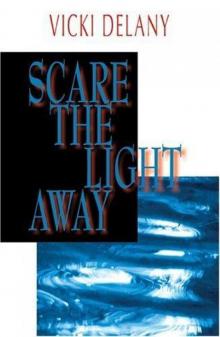 Scare the Light Away
Scare the Light Away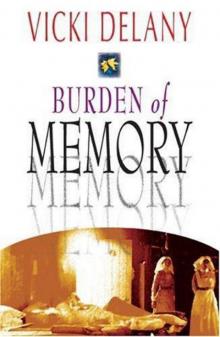 Burden of Memory
Burden of Memory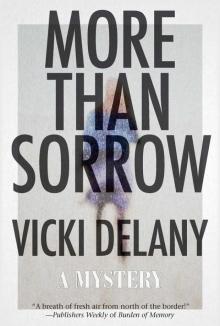 More Than Sorrow
More Than Sorrow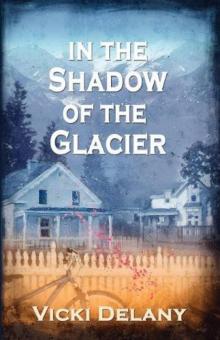 In the Shadow of the Glacier
In the Shadow of the Glacier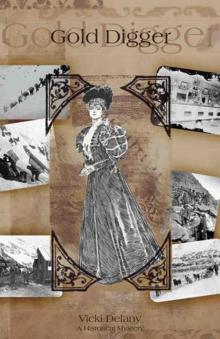 Gold Digger: A Klondike Mystery
Gold Digger: A Klondike Mystery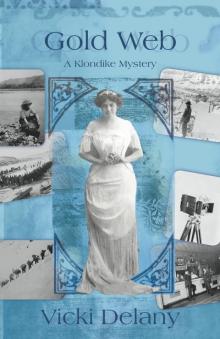 Gold Web
Gold Web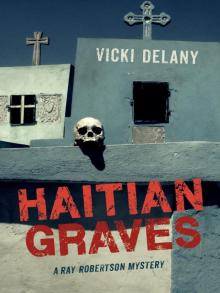 Haitian Graves
Haitian Graves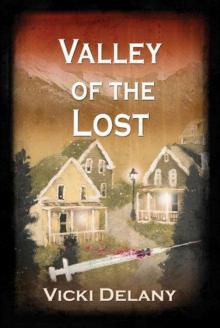 Valley of the Lost
Valley of the Lost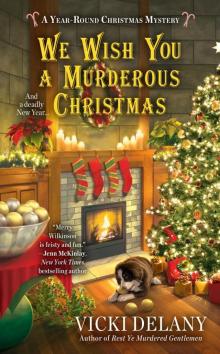 We Wish You a Murderous Christmas
We Wish You a Murderous Christmas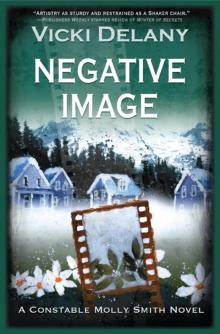 Negative Image
Negative Image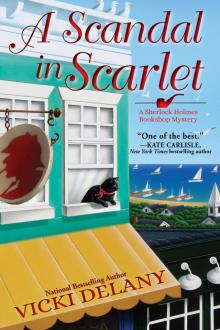 A Scandal in Scarlet
A Scandal in Scarlet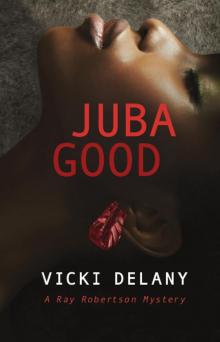 Juba Good
Juba Good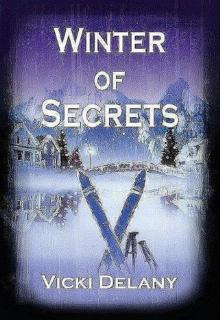 Winter of Secrets
Winter of Secrets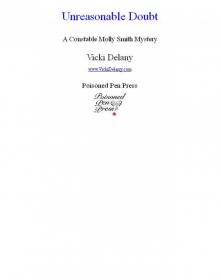 Unreasonable Doubt
Unreasonable Doubt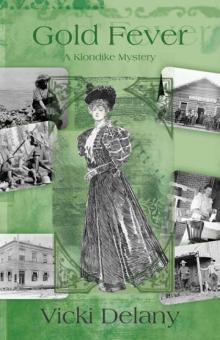 Gold Fever
Gold Fever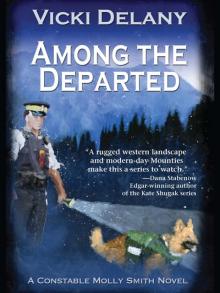 Among the Departed
Among the Departed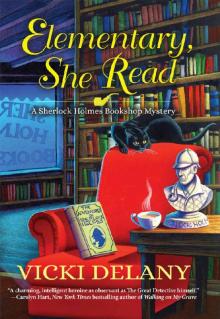 Elementary, She Read: A Sherlock Holmes Bookshop Mystery
Elementary, She Read: A Sherlock Holmes Bookshop Mystery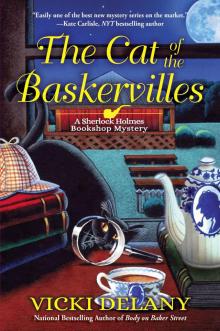 The Cat of the Baskervilles
The Cat of the Baskervilles